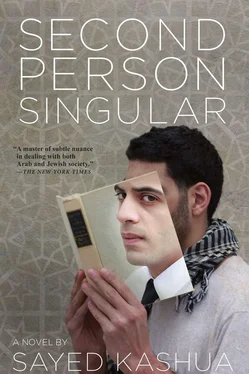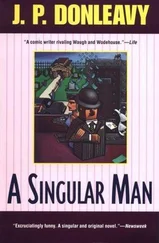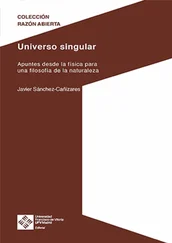It’s possible that the lawyer was tickled by the notion that Amir and Yonatan were actually a couple. If that turned out to be the case, he’d be delighted. If it turned out that his wife, before he had come along, had been in love with a gay man, it would make him the happiest person in the world. In his mind the old picture of the tough, tall, muscular Arab with the giant cock turned into one of a dainty little porcelain-faced faggot dancing with his wife at the party. It was true that in public the lawyer had never said anything against homosexuality and, in fact, took pains to publicly say that every person is free to choose whomever he or she wants to spend their lives with. He also railed against the persecution of homosexuals in Arab lands and in Iran and said that this type of treatment was a sure sign of social and cultural malaise, a fundamental lack of openness among the Arab and Islamic communities. And yet the notion of his wife dancing around with a gay man filled him with an undeniable giddiness.
The lawyer slowed down and looked at the numbers on the houses. He parked his car outside of 34 and looked across the street for 35. A small gate led to a garden and a large house. There’s no way a social worker could afford this place, the lawyer thought as he waited outside the front door, thinking that the house looked a lot more like a family home than the pad of two young gay men. The neighborhood was quiet. No cars came down the narrow street and, other than the barking of dogs and the whirr of cars on the nearby avenue, the lawyer did not hear a thing. On the front door there was a wooden sign with the name Forschmidt.
The lawyer knocked softly with his fist on the wooden door. In his hand he held The Kreutzer Sonata, his wife’s letter, and the two two-hundred-shekel bills. No matter who opened the door, the lawyer had decided to be straightforward. To tell the truth and to ask for answers. I bought a book that Yonatan sold, he rehearsed, and in the book I found a letter in my wife’s hand. I was wondering why that was. Just curious. What’s more, she said she had written that note to a colleague by the name of Amir Lahab. The lawyer knocked again but there was no response. He hit the bell, listened to its muffled ring inside the house, and waited for some time until the door opened.
MEETING
“Shalom,” I said to the man at the door, sure he was the real estate agent. “Please, come on in, you’re a little bit early but that’s fine.”
“I think you might have me confused with someone else,” the man said, still standing at the door.
“You’re not the real estate agent?” I asked.
“No,” he said and a huge smile spread across his face. Now I started to notice the Arabness of his look and his accent, and I knew without a shadow of a doubt that this was the voice from the bookstore earlier in the day. “You’re Yonatan,” he said, with only the trace of a question.
“Excuse me,” I said, “but who’s asking?”
“No one,” he answered, still smiling. “Just a lawyer who’s looking for Yonatan.”
“Why, what did he do?”
“Nothing,” the man said. “He didn’t do a thing. I believe, though, that I bought a book that he sold.” He raised The Kreutzer Sonata up to eye level as though it were an important piece of evidence. “I found a few hundred shekels inside and I said that I simply had to return them to him.”
“Thank you,” I said. “If you’d like I can give them to him.”
“So, then you’re not Yonatan?” he asked.
“I don’t see why it matters, sir,” I said.
“It doesn’t matter,” the lawyer said, pulling a folded white piece of paper from the book. “But I found a note in the book, too, and it seems to be a bit more personal than money, so I thought I would hand it over to Yonatan in person.”
“I’m Yonatan,” I said impatiently. By now I was sure that the unexpected guest was an Arab.
“Please forgive my audacity,” he said, as though performing before a packed courthouse, “but could you please show me some ID?”
“Sir, I have no idea who you are. You come to my house with an old book and some story about money. I don’t care about the money and I don’t care about the note. I don’t want to show you my ID and I don’t want to continue this conversation.” I held the door open and only a lifetime of good manners stopped me from slamming it in his face. I waited for him to leave, but perhaps I already knew that this was the first stage of what was going to be a long conversation.
“Your name’s Amir,” he said sharply in Arabic.
“What?” I said, trying to stick to Hebrew. “Who the hell are you? What do you want from me?”
“I know who you are,” he went on in Arabic. “I visited with your mother in Jaljulia yesterday. I wonder what she’ll think when she discovers that her only son is dead.”
I stood before the lawyer, said nothing, and watched as he produced a pack of cigarettes and a lighter.
“You smoke?” he asked in Arabic.
I nodded and took a cigarette.
“ Tfadal ,” be my guest, I said, and motioned him into the house, looking to see if anyone had witnessed our conversation. “You can smoke in here.”
He lit my cigarette and kept his unlit, clenched between his lips.
“Who are you?” I asked when he was seated on the couch. I had taken Ruchaleh’s usual spot and was feeling uncomfortable.
The lawyer’s gaze flitted around the room, taking in the books. “You know what,” he said, “I’ve always dreamed of having this kind of book collection. You want to sell it?”
“They’re not mine,” I said, trying to force him to get to the point, to stop gloating.
“And what about this one,” he said, knocking on the table where he’d set down The Kreutzer Sonata. “Is this one yours?”
“Please,” I said, “just tell me who you are and what you want.”
“Like I said, I’m a lawyer, but I’m here not as a lawyer but as Leila’s husband.” He stopped and looked me right in the face.
“Who’s Leila?” I asked, furrowing my brow, and I could tell immediately that he was relieved. His muscles seemed to slacken and he leaned back and lit his cigarette.
“You once worked at the outpatient clinic in east Jerusalem, right?”
“Yes.”
“Well then,” he said, flattening the note out on the table, “the whole thing started with this.”
I looked at the note, written in a very feminine and beautiful hand. “What is it? Where’s it from? That was in the book?”
“Yes,” the lawyer said. “That was in the book.”
“Okay,” I said, picking up the note, “what does that have to do with me?”
“She wrote it to you, did she not?”
“Who?”
“Leila, my wife.”
“Who’s Leila?” I said again, insisting that I did not remember.
“She worked with you at the outpatient clinic in Wadi Joz. You remember?”
“No, I don’t remember anyone by the name of Leila who worked there,” I said, traveling back to those days, to the clinic, to Wadi Joz, to the social worker I was supposed to be. “It was all boys there if I remember correctly, no?”
“There was a Leila there, too. She was an intern.”
“Ohhh,” I said, surprised, even though the lawyer did not seem convinced. “Yes, yes, I remember. You’re right. Wow, Leila. A student, right? We even once did a house call together in the Old City. How is she?”
“She’s well,” the lawyer said. “The question is how are you?”
“What’s that supposed to mean?”
“That means that I’m glad you were able to jump-start your memory and now I am going to need you to answer a few questions before I leave.”
“What kind of questions?” I asked.
Читать дальше












